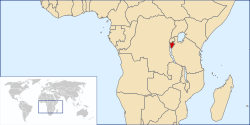
Back Burundi krallığı Azerbaijani Regne de Burundi Catalan Königreich Burundi German Reino de Burundi Spanish Burundin kuningaskunta Finnish Royaume du Burundi French बुरुंडी का साम्राज्य Hindi Kerajaan Burundi ID Regno del Burundi Italian ブルンジ王国 Japanese
Kingdom of Burundi | |||||||||
|---|---|---|---|---|---|---|---|---|---|
| c. 1680–1966 | |||||||||
| Motto: Imana, Umwami, Uburundi Dieu, le Roi et le Burundi "God, the King and Burundi" | |||||||||
| Anthem: Burundi Bwacu (Kirundi) Our Burundi | |||||||||
 Territory of the Kingdom of Burundi in 1966. | |||||||||
| Status | Independent state (1680–1890) Part of German East Africa (1890–1916) Part of Ruanda-Urundi (1916–1962) Independent state (1962–1966) | ||||||||
| Capital | Gitega Bujumbura | ||||||||
| Common languages | |||||||||
| Religion | Burundian traditional religion, Catholicism, Protestanism Islam | ||||||||
| Government | Unitary parliamentary constitutional monarchy (1962–1966) | ||||||||
| Mwami | |||||||||
• c. 1680–1709 | Ntare I (first) | ||||||||
• 1966 | Ntare V (last) | ||||||||
| Prime Minister | |||||||||
• 1961 | Joseph Cimpaye (first) | ||||||||
• 1966 | Michel Micombero (last) | ||||||||
| Legislature | Parliament (from 1962) | ||||||||
| Senate (from 1962) | |||||||||
| National Assembly (from 1962) | |||||||||
| History | |||||||||
• Established | c. 1680 | ||||||||
| 1 July 1890 | |||||||||
• Formation of Ruanda-Urundi | 20 July 1922 | ||||||||
• Autonomy | 21 December 1961 | ||||||||
• Independence | 1 July 1962 | ||||||||
| 28 November 1966 | |||||||||
| |||||||||
| Today part of | Burundi | ||||||||
The Kingdom of Burundi (French: Royaume du Burundi), also known as Kingdom of Urundi (Kirundi: Ubwami bw'Urundi), was a Bantu kingdom in the modern-day Republic of Burundi. The Ganwa monarchs (with the title of mwami) ruled over both Hutus and Tutsis. Created in the 16th century, the kingdom was preserved under German and Belgian colonial rule in the late 19th and early 20th century and was an independent state between 1962 and 1966.
© MMXXIII Rich X Search. We shall prevail. All rights reserved. Rich X Search

